
Weimar culture was the emergence of the arts and sciences that happened in Germany during the Weimar Republic, the latter during that part of the interwar period between Germany's defeat in World War I in 1918 and Hitler's rise to power in 1933. 1920s Berlin was at the hectic center of the Weimar culture. Although not part of the Weimar Republic, some authors also include the German-speaking Austria, and particularly Vienna, as part of Weimar culture.

Eugene Luther Gore Vidal was an American writer and public intellectual known for his epigrammatic wit. His novels and essays interrogated the social and sexual norms he perceived as driving American life. Vidal was heavily involved in politics, and unsuccessfully sought office twice as a Democratic Party candidate, first in 1960 to the U.S. House of Representatives, and later in 1982 to the U.S. Senate.

Christopher William Bradshaw Isherwood was an Anglo-American novelist, playwright, screenwriter, autobiographer, and diarist. His best-known works include Goodbye to Berlin (1939), a semi-autobiographical novel which inspired the musical Cabaret (1966); A Single Man (1964), adapted as a film by Tom Ford in 2009; and Christopher and His Kind (1976), a memoir which "carried him into the heart of the Gay Liberation movement".

Paul Frederic Bowles was an American expatriate composer, author, and translator. He became associated with the Moroccan city of Tangier in the Interzone, where he settled in 1947 and lived for 52 years to the end of his life.
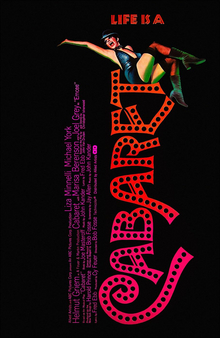
Cabaret is a 1972 American musical period drama film directed by Bob Fosse from a screenplay by Jay Allen, based on the stage musical of the same name by John Kander, Fred Ebb, and Joe Masteroff, which in turn was based on the 1951 play I Am a Camera by John Van Druten and the 1939 novel Goodbye to Berlin by Christopher Isherwood. It stars Liza Minnelli, Michael York, Helmut Griem, Marisa Berenson, and Joel Grey. Multiple numbers from the stage score were used for the film, which also featured three other songs by Kander and Ebb, including two written for the adaptation.
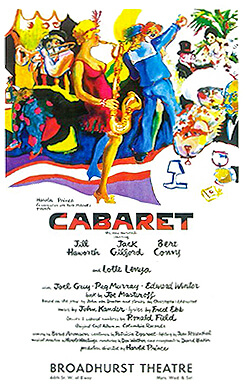
Cabaret is a musical with music by John Kander, lyrics by Fred Ebb, and a book by Joe Masteroff. It is based on the 1951 play I Am a Camera by John Van Druten, which in turn was based on the 1939 novel Goodbye to Berlin by Christopher Isherwood.
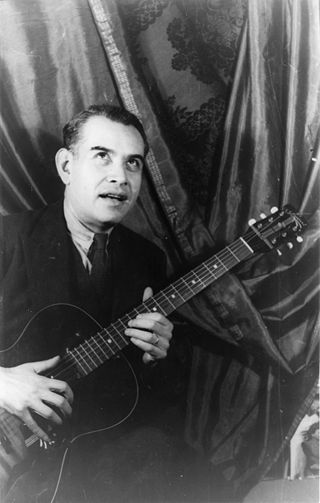
Rufino del Carmen Arellanes Tamayo was a Mexican painter of Zapotec heritage, born in Oaxaca de Juárez, Mexico. Tamayo was active in the mid-20th century in Mexico and New York, painting figurative abstraction with surrealist influences.

Donald Jess Bachardy is an American portrait artist. He resides in Santa Monica, California. Bachardy was the partner of Christopher Isherwood for over 30 years.
The Golden Twenties was a particular vibrant period in the history of Berlin. After the Greater Berlin Act, the city became the third largest municipality in the world and experienced its heyday as a major world city. It was known for its leadership roles in science, the humanities, art, music, film, architecture, higher education, government, diplomacy and industries.
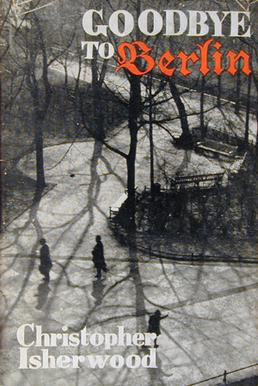
Goodbye to Berlin is a 1939 novel by Anglo-American writer Christopher Isherwood set during the waning days of the Weimar Republic. The novel recounts Isherwood's 1929–1932 sojourn as a pleasure-seeking British expatriate on the eve of Adolf Hitler's ascension as Chancellor of Germany and consists of a "series of sketches of disintegrating Berlin, its slums and nightclubs and comfortable villas, its odd maladapted types and its complacent burghers." The plot was based on factual events in Isherwood's life, and the novel's characters were based upon actual persons. The insouciant flapper Sally Bowles was based on teenage cabaret singer Jean Ross who became Isherwood's friend during his sojourn.

The Berlin Stories is a 1945 omnibus by Anglo-American writer Christopher Isherwood and consisting of the novels Mr Norris Changes Trains (1935) and Goodbye to Berlin (1939). The two novels are set in Jazz Age Berlin between 1930 and 1933 on the cusp of Adolf Hitler's ascent to power. Berlin is portrayed by Isherwood during this chaotic interwar period as a carnival of debauchery and despair inhabited by desperate people who are unaware of the national catastrophe that awaits them.
Gore Vidal: The Man Who Said No (1983) is a documentary film directed, produced, and edited by Gary Conklin. The film follows famed American writer and political gadfly Gore Vidal in his quixotic campaign against incumbent California Governor Jerry Brown for the Democratic nomination for the United States Senate in 1982. Vidal and State Sen. Paul B. Carpenter each won the support of 15.1% of voters in the primary election, but were easily outdistanced by Brown, who racked up 50.7% of the vote.
Memories of Berlin: The Twilight of Weimar Culture is a documentary film produced and directed by Gary Conklin, and released in 1976.

Denham "Denny" Fouts was an American male prostitute and socialite. He served as the inspiration for characters by Truman Capote, Gore Vidal, Christopher Isherwood, and Gavin Lambert. He was allegedly a lover of Prince Paul of Greece and French actor Jean Marais.
Claudio Nelson Bravo Camus was a Chilean hyperrealist painter. He was greatly influenced by Renaissance and Baroque artists, as well as Surrealist painters such as Salvador Dalí. He lived and worked in Tangier, Morocco, beginning in 1972. Bravo also lived in Chile, New York and Spain. He was known mainly for his paintings of still lifes, portraits and packages, but he had also done drawings, lithographs, engraving and figural bronze sculptures. Bravo painted many prominent figures in society, including caudillo Franco of Spain, President Ferdinand Marcos and First Lady Imelda Marcos of the Philippines and Malcolm Forbes.
Gunther Gerzso was a Mexican painter, designer and director and screenwriter for film and theatre.

Sally Bowles is a fictional character created by English-American novelist Christopher Isherwood and based upon 19-year-old cabaret singer Jean Ross. The character debuted in Isherwood's 1937 novella Sally Bowles published by Hogarth Press, and commentators have described the novella as "one of Isherwood's most accomplished pieces of writing." The work was republished in the 1939 novel Goodbye to Berlin and in the 1945 anthology The Berlin Stories.
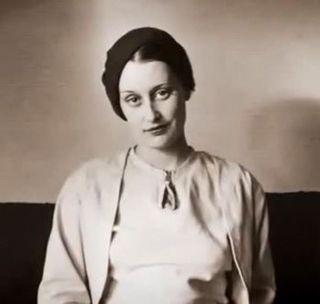
Jean Iris Ross Cockburn was a British journalist, political activist, and film critic. During the Spanish Civil War (1936–39), she was a war correspondent for the Daily Express and is alleged to have been a press agent for Joseph Stalin's Comintern. A skilled writer, Ross worked as a film critic for the Daily Worker. Throughout her life, she wrote political criticism, anti-fascist polemics, and socialist manifestos for a number of disparate organisations such as the British Workers' Film and Photo League. She was a devout Stalinist and a lifelong member of the Communist Party of Great Britain.
Pinturas de Tamayo is an orchestral composition in five movements by the American composer Steven Stucky. The work was commissioned by the Chicago Symphony Orchestra, who premiered the work on March 28, 1996, under the conductor Michael Gielen in Symphony Center, Chicago. The piece is inspired by the paintings of the Mexican artist Rufino Tamayo.
Sylvester & Orphanos was a publishing house originally founded in Los Angeles by Ralph Sylvester, Stathis Orphanos and George Fisher in 1972. When Fisher moved to New York City, Sylvester & Orphanos specialized in limited-signed press books.












